Western Sydney University: Palliative Care in Aged Care Report
VerifiedAdded on 2022/11/17
|13
|4873
|444
Report
AI Summary
This report delves into the critical issues surrounding palliative care within residential aged care facilities. It begins by defining palliative care and its application in aged care settings, emphasizing symptom control and improved quality of life for residents. The report then explores advanced care directives (ACDs), their significance, and their role in ensuring patient autonomy and preferences are respected, particularly in end-of-life care. It further examines contemporary issues in aged care from political, philosophical, legal, and ethical perspectives, highlighting dilemmas faced by healthcare professionals. The report also discusses strategies to improve palliative care service provision, including models of wellness and active aging. The report underscores the importance of ACDs and ethical considerations in providing comprehensive care for the elderly in residential settings. It also mentions the importance of health care ethics and ethical dilemmas or problems faced by the health professionals or doctors in the context of end-of-life care.
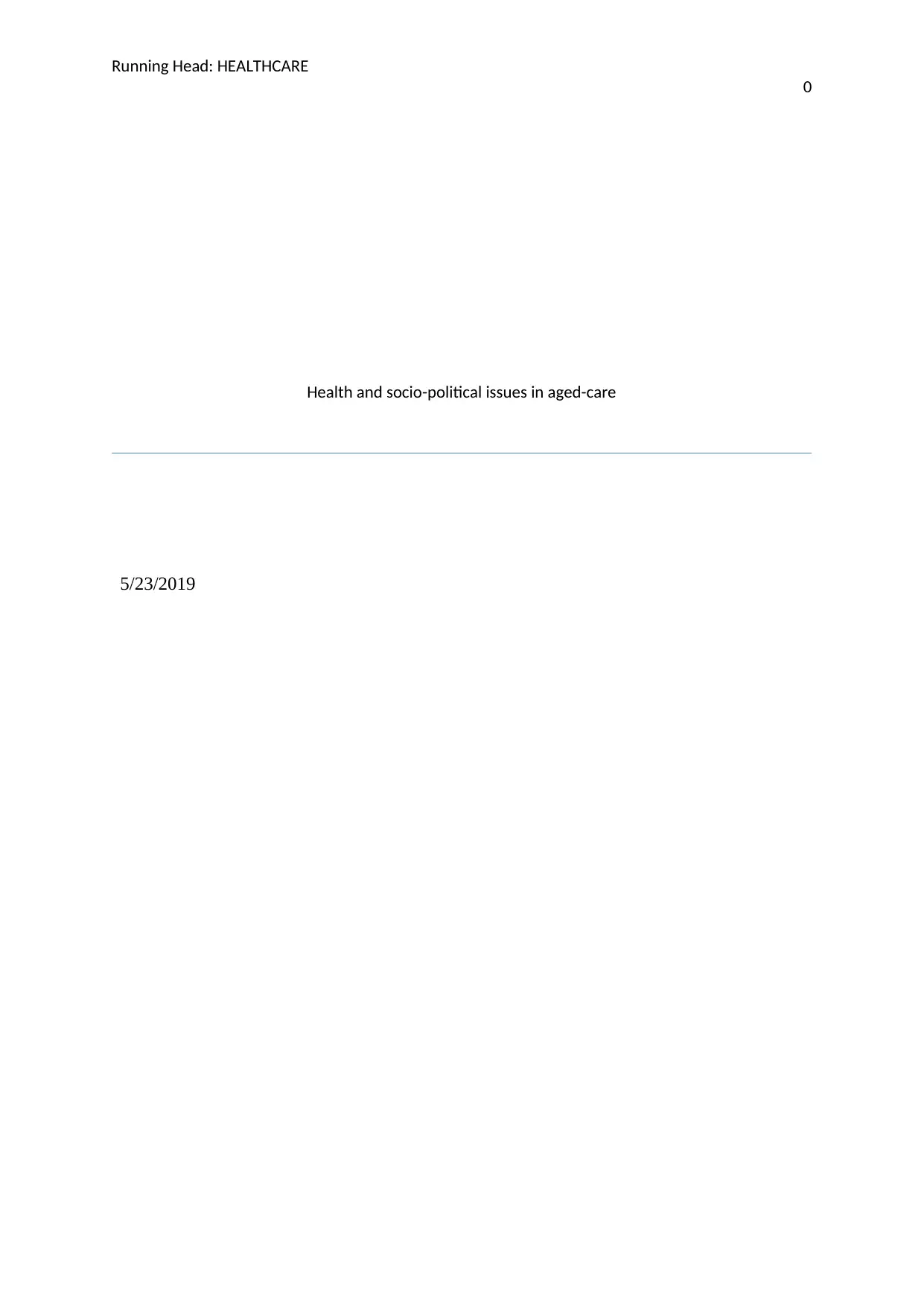
Running Head: HEALTHCARE
0
Health and socio-political issues in aged-care
5/23/2019
0
Health and socio-political issues in aged-care
5/23/2019
Paraphrase This Document
Need a fresh take? Get an instant paraphrase of this document with our AI Paraphraser
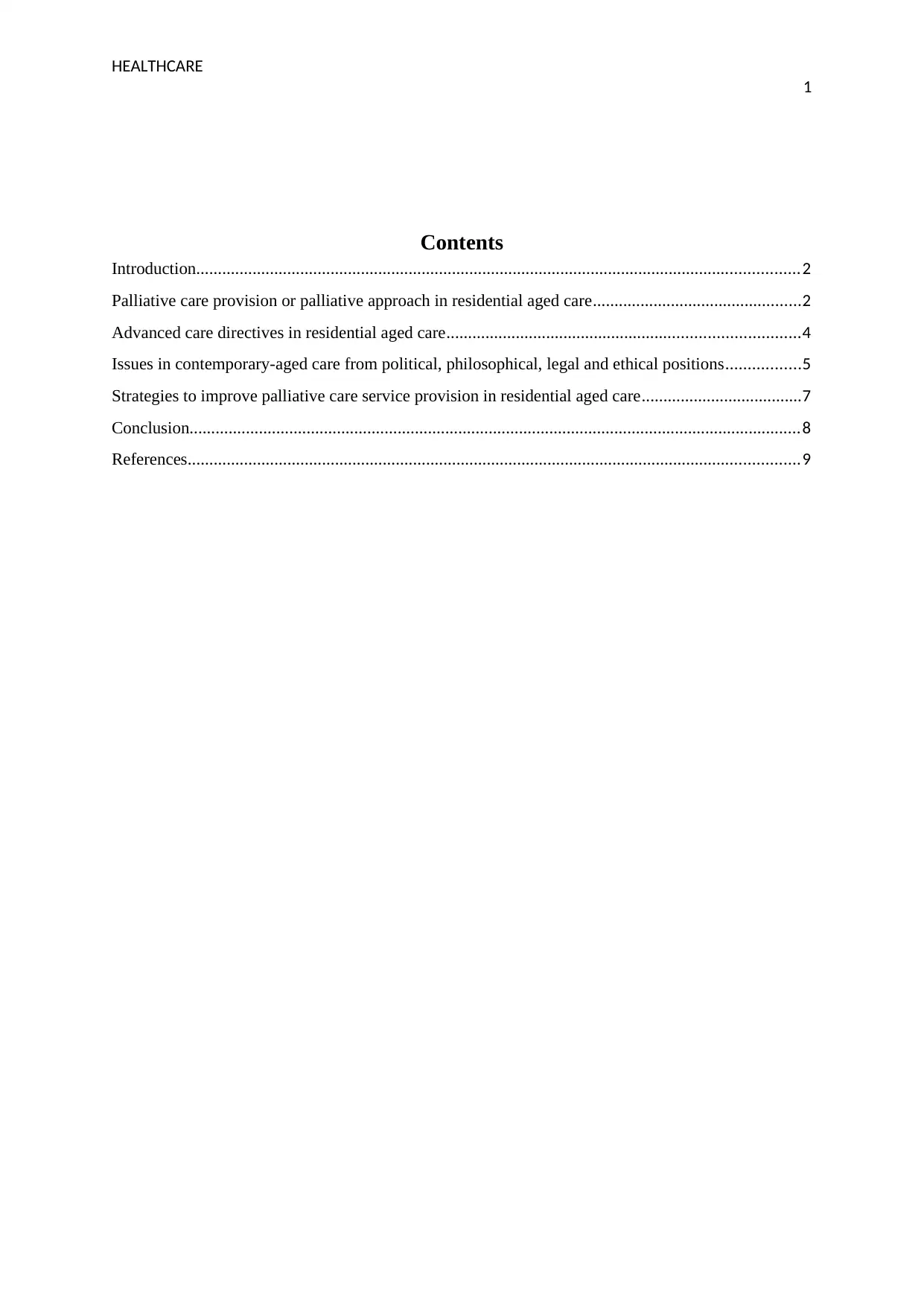
HEALTHCARE
1
Contents
Introduction...........................................................................................................................................2
Palliative care provision or palliative approach in residential aged care................................................2
Advanced care directives in residential aged care.................................................................................4
Issues in contemporary-aged care from political, philosophical, legal and ethical positions.................5
Strategies to improve palliative care service provision in residential aged care.....................................7
Conclusion.............................................................................................................................................8
References.............................................................................................................................................9
1
Contents
Introduction...........................................................................................................................................2
Palliative care provision or palliative approach in residential aged care................................................2
Advanced care directives in residential aged care.................................................................................4
Issues in contemporary-aged care from political, philosophical, legal and ethical positions.................5
Strategies to improve palliative care service provision in residential aged care.....................................7
Conclusion.............................................................................................................................................8
References.............................................................................................................................................9
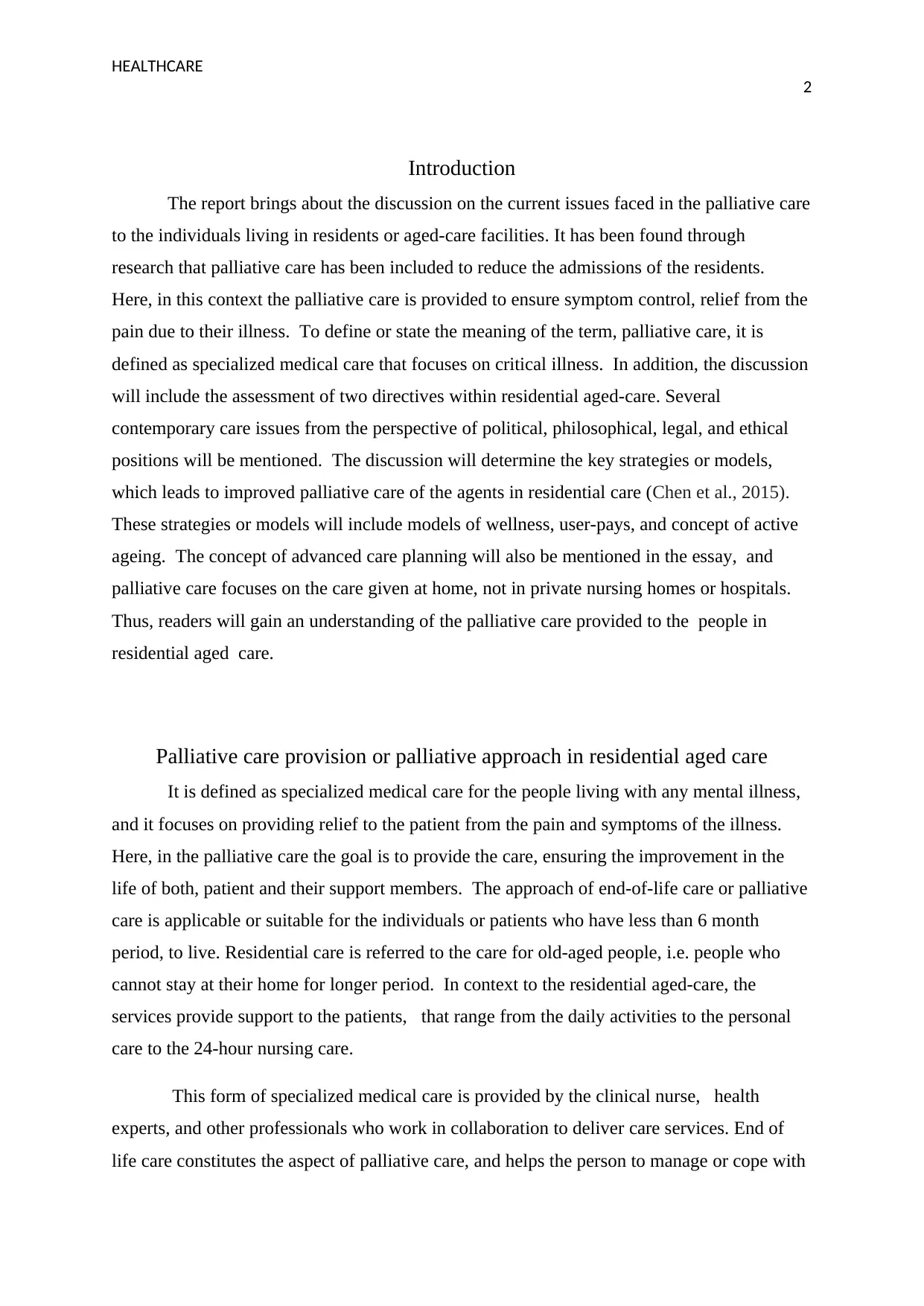
HEALTHCARE
2
Introduction
The report brings about the discussion on the current issues faced in the palliative care
to the individuals living in residents or aged-care facilities. It has been found through
research that palliative care has been included to reduce the admissions of the residents.
Here, in this context the palliative care is provided to ensure symptom control, relief from the
pain due to their illness. To define or state the meaning of the term, palliative care, it is
defined as specialized medical care that focuses on critical illness. In addition, the discussion
will include the assessment of two directives within residential aged-care. Several
contemporary care issues from the perspective of political, philosophical, legal, and ethical
positions will be mentioned. The discussion will determine the key strategies or models,
which leads to improved palliative care of the agents in residential care (Chen et al., 2015).
These strategies or models will include models of wellness, user-pays, and concept of active
ageing. The concept of advanced care planning will also be mentioned in the essay, and
palliative care focuses on the care given at home, not in private nursing homes or hospitals.
Thus, readers will gain an understanding of the palliative care provided to the people in
residential aged care.
Palliative care provision or palliative approach in residential aged care
It is defined as specialized medical care for the people living with any mental illness,
and it focuses on providing relief to the patient from the pain and symptoms of the illness.
Here, in the palliative care the goal is to provide the care, ensuring the improvement in the
life of both, patient and their support members. The approach of end-of-life care or palliative
care is applicable or suitable for the individuals or patients who have less than 6 month
period, to live. Residential care is referred to the care for old-aged people, i.e. people who
cannot stay at their home for longer period. In context to the residential aged-care, the
services provide support to the patients, that range from the daily activities to the personal
care to the 24-hour nursing care.
This form of specialized medical care is provided by the clinical nurse, health
experts, and other professionals who work in collaboration to deliver care services. End of
life care constitutes the aspect of palliative care, and helps the person to manage or cope with
2
Introduction
The report brings about the discussion on the current issues faced in the palliative care
to the individuals living in residents or aged-care facilities. It has been found through
research that palliative care has been included to reduce the admissions of the residents.
Here, in this context the palliative care is provided to ensure symptom control, relief from the
pain due to their illness. To define or state the meaning of the term, palliative care, it is
defined as specialized medical care that focuses on critical illness. In addition, the discussion
will include the assessment of two directives within residential aged-care. Several
contemporary care issues from the perspective of political, philosophical, legal, and ethical
positions will be mentioned. The discussion will determine the key strategies or models,
which leads to improved palliative care of the agents in residential care (Chen et al., 2015).
These strategies or models will include models of wellness, user-pays, and concept of active
ageing. The concept of advanced care planning will also be mentioned in the essay, and
palliative care focuses on the care given at home, not in private nursing homes or hospitals.
Thus, readers will gain an understanding of the palliative care provided to the people in
residential aged care.
Palliative care provision or palliative approach in residential aged care
It is defined as specialized medical care for the people living with any mental illness,
and it focuses on providing relief to the patient from the pain and symptoms of the illness.
Here, in the palliative care the goal is to provide the care, ensuring the improvement in the
life of both, patient and their support members. The approach of end-of-life care or palliative
care is applicable or suitable for the individuals or patients who have less than 6 month
period, to live. Residential care is referred to the care for old-aged people, i.e. people who
cannot stay at their home for longer period. In context to the residential aged-care, the
services provide support to the patients, that range from the daily activities to the personal
care to the 24-hour nursing care.
This form of specialized medical care is provided by the clinical nurse, health
experts, and other professionals who work in collaboration to deliver care services. End of
life care constitutes the aspect of palliative care, and helps the person to manage or cope with
⊘ This is a preview!⊘
Do you want full access?
Subscribe today to unlock all pages.

Trusted by 1+ million students worldwide
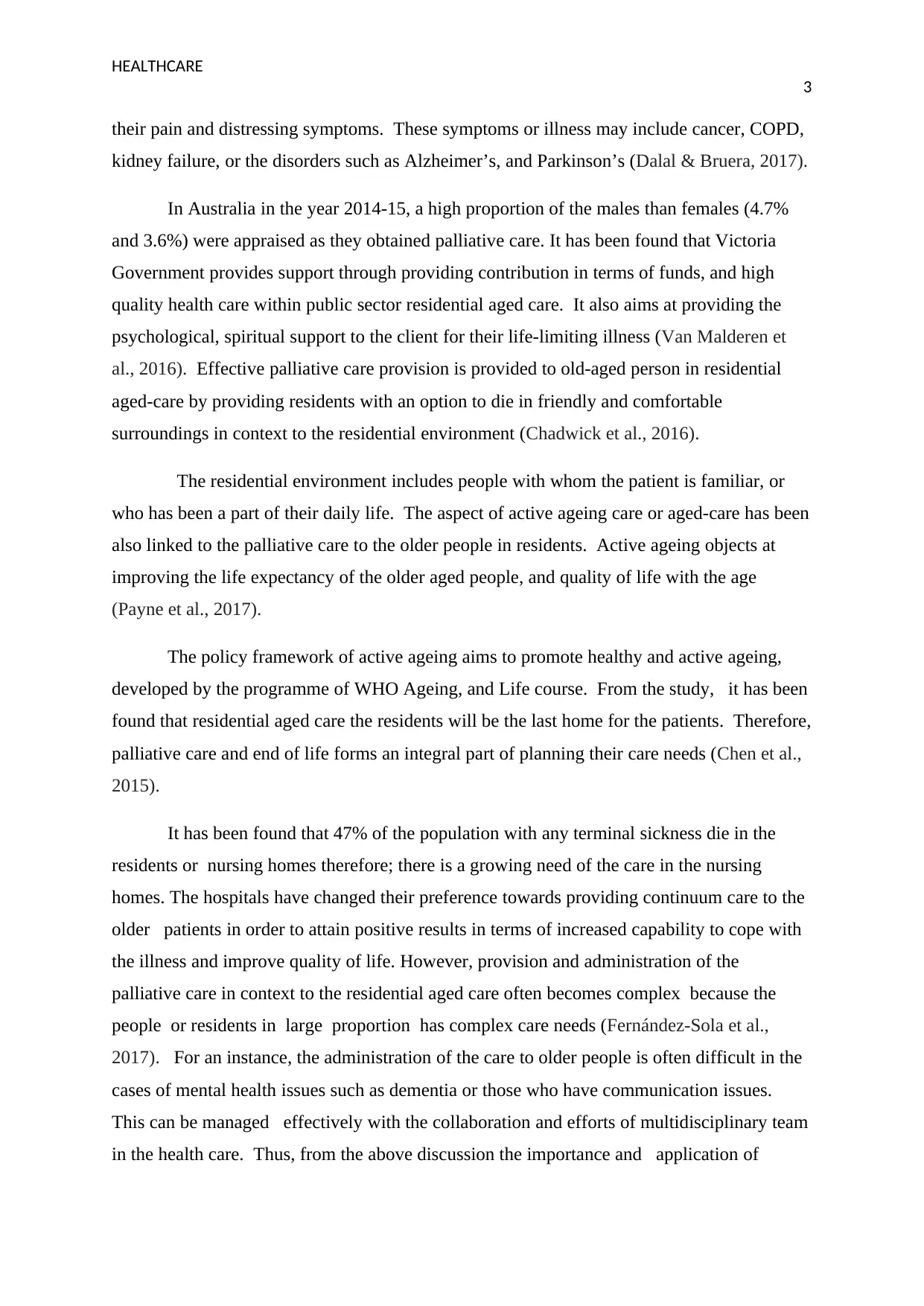
HEALTHCARE
3
their pain and distressing symptoms. These symptoms or illness may include cancer, COPD,
kidney failure, or the disorders such as Alzheimer’s, and Parkinson’s (Dalal & Bruera, 2017).
In Australia in the year 2014-15, a high proportion of the males than females (4.7%
and 3.6%) were appraised as they obtained palliative care. It has been found that Victoria
Government provides support through providing contribution in terms of funds, and high
quality health care within public sector residential aged care. It also aims at providing the
psychological, spiritual support to the client for their life-limiting illness (Van Malderen et
al., 2016). Effective palliative care provision is provided to old-aged person in residential
aged-care by providing residents with an option to die in friendly and comfortable
surroundings in context to the residential environment (Chadwick et al., 2016).
The residential environment includes people with whom the patient is familiar, or
who has been a part of their daily life. The aspect of active ageing care or aged-care has been
also linked to the palliative care to the older people in residents. Active ageing objects at
improving the life expectancy of the older aged people, and quality of life with the age
(Payne et al., 2017).
The policy framework of active ageing aims to promote healthy and active ageing,
developed by the programme of WHO Ageing, and Life course. From the study, it has been
found that residential aged care the residents will be the last home for the patients. Therefore,
palliative care and end of life forms an integral part of planning their care needs (Chen et al.,
2015).
It has been found that 47% of the population with any terminal sickness die in the
residents or nursing homes therefore; there is a growing need of the care in the nursing
homes. The hospitals have changed their preference towards providing continuum care to the
older patients in order to attain positive results in terms of increased capability to cope with
the illness and improve quality of life. However, provision and administration of the
palliative care in context to the residential aged care often becomes complex because the
people or residents in large proportion has complex care needs (Fernández-Sola et al.,
2017). For an instance, the administration of the care to older people is often difficult in the
cases of mental health issues such as dementia or those who have communication issues.
This can be managed effectively with the collaboration and efforts of multidisciplinary team
in the health care. Thus, from the above discussion the importance and application of
3
their pain and distressing symptoms. These symptoms or illness may include cancer, COPD,
kidney failure, or the disorders such as Alzheimer’s, and Parkinson’s (Dalal & Bruera, 2017).
In Australia in the year 2014-15, a high proportion of the males than females (4.7%
and 3.6%) were appraised as they obtained palliative care. It has been found that Victoria
Government provides support through providing contribution in terms of funds, and high
quality health care within public sector residential aged care. It also aims at providing the
psychological, spiritual support to the client for their life-limiting illness (Van Malderen et
al., 2016). Effective palliative care provision is provided to old-aged person in residential
aged-care by providing residents with an option to die in friendly and comfortable
surroundings in context to the residential environment (Chadwick et al., 2016).
The residential environment includes people with whom the patient is familiar, or
who has been a part of their daily life. The aspect of active ageing care or aged-care has been
also linked to the palliative care to the older people in residents. Active ageing objects at
improving the life expectancy of the older aged people, and quality of life with the age
(Payne et al., 2017).
The policy framework of active ageing aims to promote healthy and active ageing,
developed by the programme of WHO Ageing, and Life course. From the study, it has been
found that residential aged care the residents will be the last home for the patients. Therefore,
palliative care and end of life forms an integral part of planning their care needs (Chen et al.,
2015).
It has been found that 47% of the population with any terminal sickness die in the
residents or nursing homes therefore; there is a growing need of the care in the nursing
homes. The hospitals have changed their preference towards providing continuum care to the
older patients in order to attain positive results in terms of increased capability to cope with
the illness and improve quality of life. However, provision and administration of the
palliative care in context to the residential aged care often becomes complex because the
people or residents in large proportion has complex care needs (Fernández-Sola et al.,
2017). For an instance, the administration of the care to older people is often difficult in the
cases of mental health issues such as dementia or those who have communication issues.
This can be managed effectively with the collaboration and efforts of multidisciplinary team
in the health care. Thus, from the above discussion the importance and application of
Paraphrase This Document
Need a fresh take? Get an instant paraphrase of this document with our AI Paraphraser
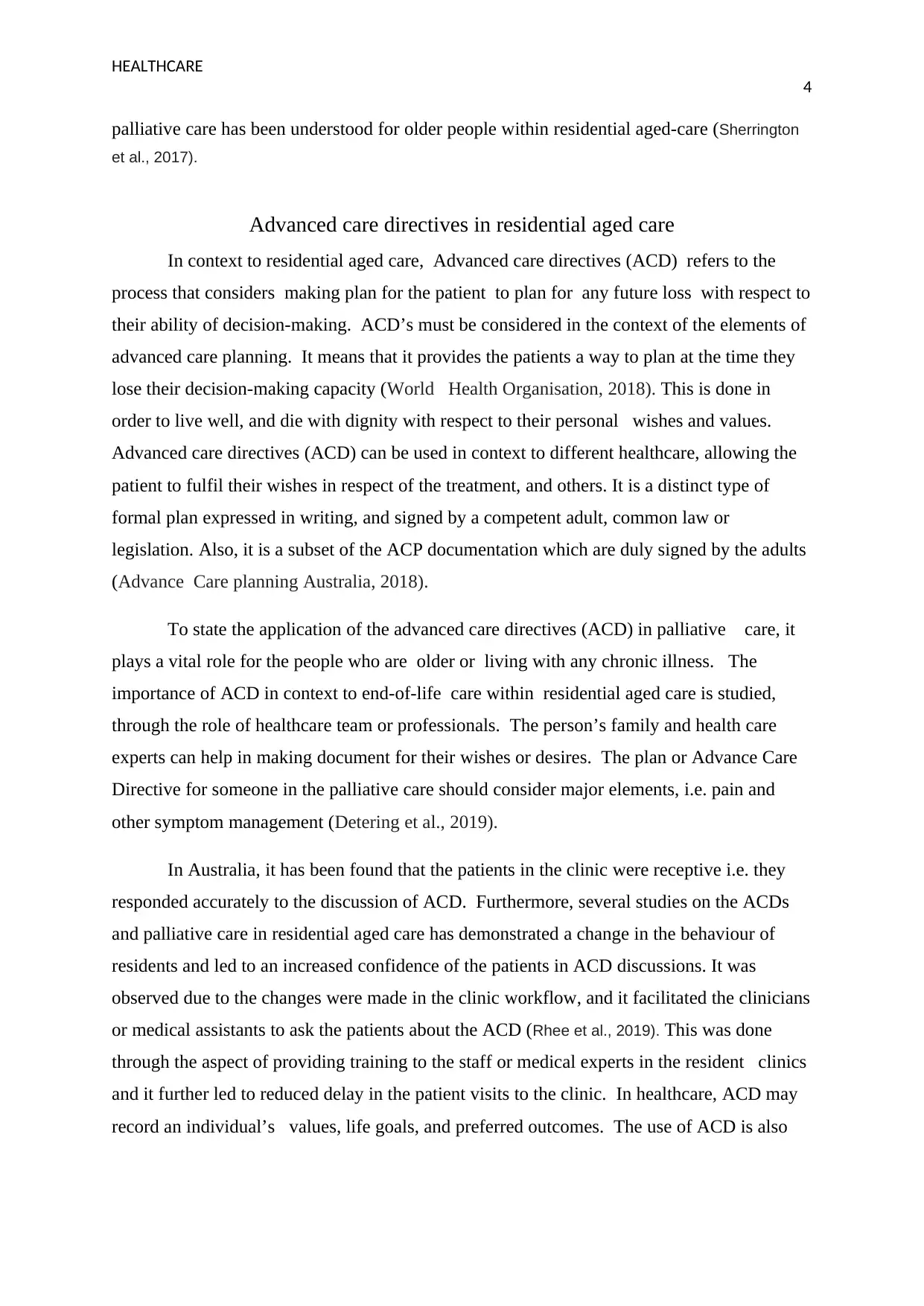
HEALTHCARE
4
palliative care has been understood for older people within residential aged-care (Sherrington
et al., 2017).
Advanced care directives in residential aged care
In context to residential aged care, Advanced care directives (ACD) refers to the
process that considers making plan for the patient to plan for any future loss with respect to
their ability of decision-making. ACD’s must be considered in the context of the elements of
advanced care planning. It means that it provides the patients a way to plan at the time they
lose their decision-making capacity (World Health Organisation, 2018). This is done in
order to live well, and die with dignity with respect to their personal wishes and values.
Advanced care directives (ACD) can be used in context to different healthcare, allowing the
patient to fulfil their wishes in respect of the treatment, and others. It is a distinct type of
formal plan expressed in writing, and signed by a competent adult, common law or
legislation. Also, it is a subset of the ACP documentation which are duly signed by the adults
(Advance Care planning Australia, 2018).
To state the application of the advanced care directives (ACD) in palliative care, it
plays a vital role for the people who are older or living with any chronic illness. The
importance of ACD in context to end-of-life care within residential aged care is studied,
through the role of healthcare team or professionals. The person’s family and health care
experts can help in making document for their wishes or desires. The plan or Advance Care
Directive for someone in the palliative care should consider major elements, i.e. pain and
other symptom management (Detering et al., 2019).
In Australia, it has been found that the patients in the clinic were receptive i.e. they
responded accurately to the discussion of ACD. Furthermore, several studies on the ACDs
and palliative care in residential aged care has demonstrated a change in the behaviour of
residents and led to an increased confidence of the patients in ACD discussions. It was
observed due to the changes were made in the clinic workflow, and it facilitated the clinicians
or medical assistants to ask the patients about the ACD (Rhee et al., 2019). This was done
through the aspect of providing training to the staff or medical experts in the resident clinics
and it further led to reduced delay in the patient visits to the clinic. In healthcare, ACD may
record an individual’s values, life goals, and preferred outcomes. The use of ACD is also
4
palliative care has been understood for older people within residential aged-care (Sherrington
et al., 2017).
Advanced care directives in residential aged care
In context to residential aged care, Advanced care directives (ACD) refers to the
process that considers making plan for the patient to plan for any future loss with respect to
their ability of decision-making. ACD’s must be considered in the context of the elements of
advanced care planning. It means that it provides the patients a way to plan at the time they
lose their decision-making capacity (World Health Organisation, 2018). This is done in
order to live well, and die with dignity with respect to their personal wishes and values.
Advanced care directives (ACD) can be used in context to different healthcare, allowing the
patient to fulfil their wishes in respect of the treatment, and others. It is a distinct type of
formal plan expressed in writing, and signed by a competent adult, common law or
legislation. Also, it is a subset of the ACP documentation which are duly signed by the adults
(Advance Care planning Australia, 2018).
To state the application of the advanced care directives (ACD) in palliative care, it
plays a vital role for the people who are older or living with any chronic illness. The
importance of ACD in context to end-of-life care within residential aged care is studied,
through the role of healthcare team or professionals. The person’s family and health care
experts can help in making document for their wishes or desires. The plan or Advance Care
Directive for someone in the palliative care should consider major elements, i.e. pain and
other symptom management (Detering et al., 2019).
In Australia, it has been found that the patients in the clinic were receptive i.e. they
responded accurately to the discussion of ACD. Furthermore, several studies on the ACDs
and palliative care in residential aged care has demonstrated a change in the behaviour of
residents and led to an increased confidence of the patients in ACD discussions. It was
observed due to the changes were made in the clinic workflow, and it facilitated the clinicians
or medical assistants to ask the patients about the ACD (Rhee et al., 2019). This was done
through the aspect of providing training to the staff or medical experts in the resident clinics
and it further led to reduced delay in the patient visits to the clinic. In healthcare, ACD may
record an individual’s values, life goals, and preferred outcomes. The use of ACD is also
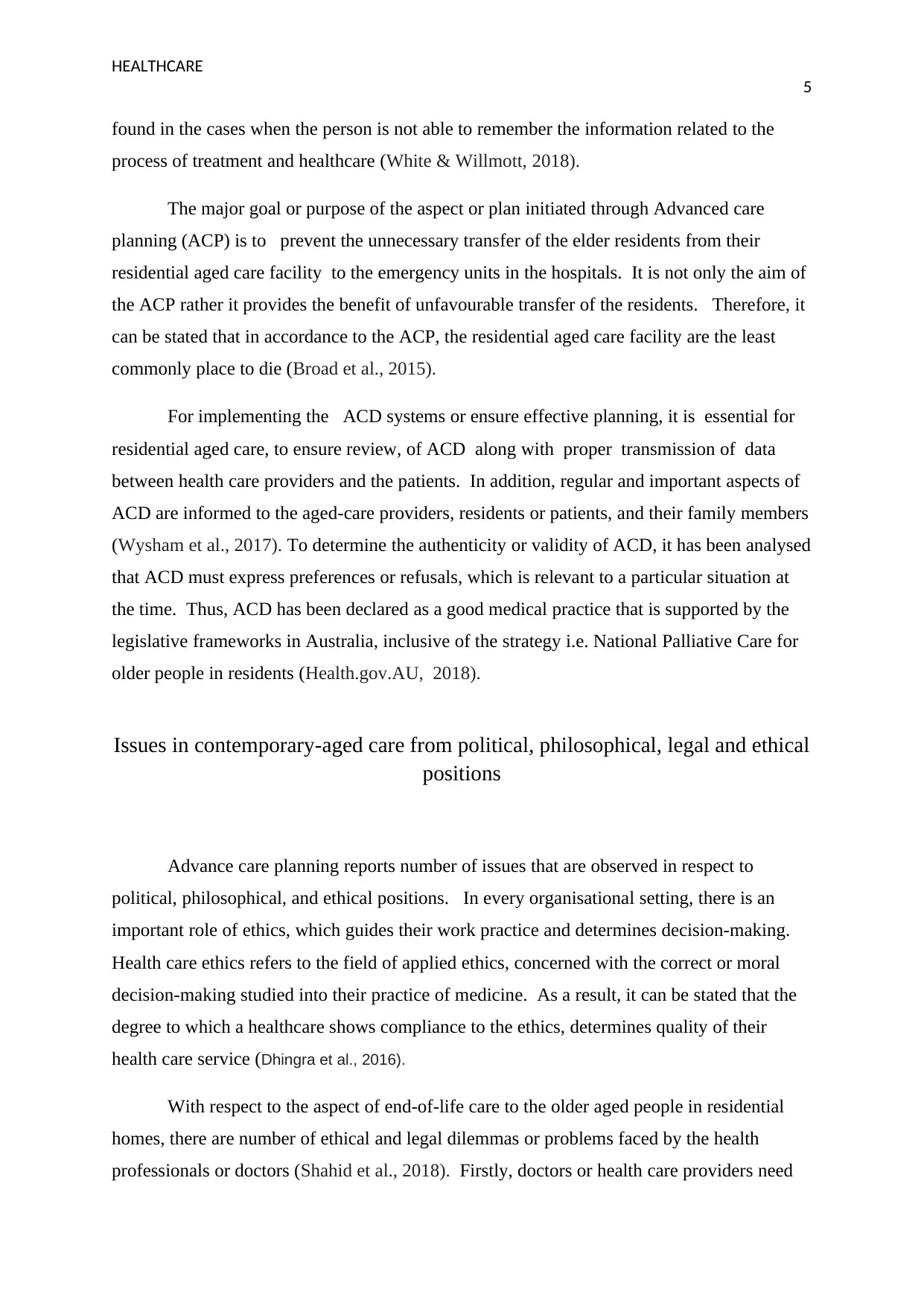
HEALTHCARE
5
found in the cases when the person is not able to remember the information related to the
process of treatment and healthcare (White & Willmott, 2018).
The major goal or purpose of the aspect or plan initiated through Advanced care
planning (ACP) is to prevent the unnecessary transfer of the elder residents from their
residential aged care facility to the emergency units in the hospitals. It is not only the aim of
the ACP rather it provides the benefit of unfavourable transfer of the residents. Therefore, it
can be stated that in accordance to the ACP, the residential aged care facility are the least
commonly place to die (Broad et al., 2015).
For implementing the ACD systems or ensure effective planning, it is essential for
residential aged care, to ensure review, of ACD along with proper transmission of data
between health care providers and the patients. In addition, regular and important aspects of
ACD are informed to the aged-care providers, residents or patients, and their family members
(Wysham et al., 2017). To determine the authenticity or validity of ACD, it has been analysed
that ACD must express preferences or refusals, which is relevant to a particular situation at
the time. Thus, ACD has been declared as a good medical practice that is supported by the
legislative frameworks in Australia, inclusive of the strategy i.e. National Palliative Care for
older people in residents (Health.gov.AU, 2018).
Issues in contemporary-aged care from political, philosophical, legal and ethical
positions
Advance care planning reports number of issues that are observed in respect to
political, philosophical, and ethical positions. In every organisational setting, there is an
important role of ethics, which guides their work practice and determines decision-making.
Health care ethics refers to the field of applied ethics, concerned with the correct or moral
decision-making studied into their practice of medicine. As a result, it can be stated that the
degree to which a healthcare shows compliance to the ethics, determines quality of their
health care service (Dhingra et al., 2016).
With respect to the aspect of end-of-life care to the older aged people in residential
homes, there are number of ethical and legal dilemmas or problems faced by the health
professionals or doctors (Shahid et al., 2018). Firstly, doctors or health care providers need
5
found in the cases when the person is not able to remember the information related to the
process of treatment and healthcare (White & Willmott, 2018).
The major goal or purpose of the aspect or plan initiated through Advanced care
planning (ACP) is to prevent the unnecessary transfer of the elder residents from their
residential aged care facility to the emergency units in the hospitals. It is not only the aim of
the ACP rather it provides the benefit of unfavourable transfer of the residents. Therefore, it
can be stated that in accordance to the ACP, the residential aged care facility are the least
commonly place to die (Broad et al., 2015).
For implementing the ACD systems or ensure effective planning, it is essential for
residential aged care, to ensure review, of ACD along with proper transmission of data
between health care providers and the patients. In addition, regular and important aspects of
ACD are informed to the aged-care providers, residents or patients, and their family members
(Wysham et al., 2017). To determine the authenticity or validity of ACD, it has been analysed
that ACD must express preferences or refusals, which is relevant to a particular situation at
the time. Thus, ACD has been declared as a good medical practice that is supported by the
legislative frameworks in Australia, inclusive of the strategy i.e. National Palliative Care for
older people in residents (Health.gov.AU, 2018).
Issues in contemporary-aged care from political, philosophical, legal and ethical
positions
Advance care planning reports number of issues that are observed in respect to
political, philosophical, and ethical positions. In every organisational setting, there is an
important role of ethics, which guides their work practice and determines decision-making.
Health care ethics refers to the field of applied ethics, concerned with the correct or moral
decision-making studied into their practice of medicine. As a result, it can be stated that the
degree to which a healthcare shows compliance to the ethics, determines quality of their
health care service (Dhingra et al., 2016).
With respect to the aspect of end-of-life care to the older aged people in residential
homes, there are number of ethical and legal dilemmas or problems faced by the health
professionals or doctors (Shahid et al., 2018). Firstly, doctors or health care providers need
⊘ This is a preview!⊘
Do you want full access?
Subscribe today to unlock all pages.

Trusted by 1+ million students worldwide
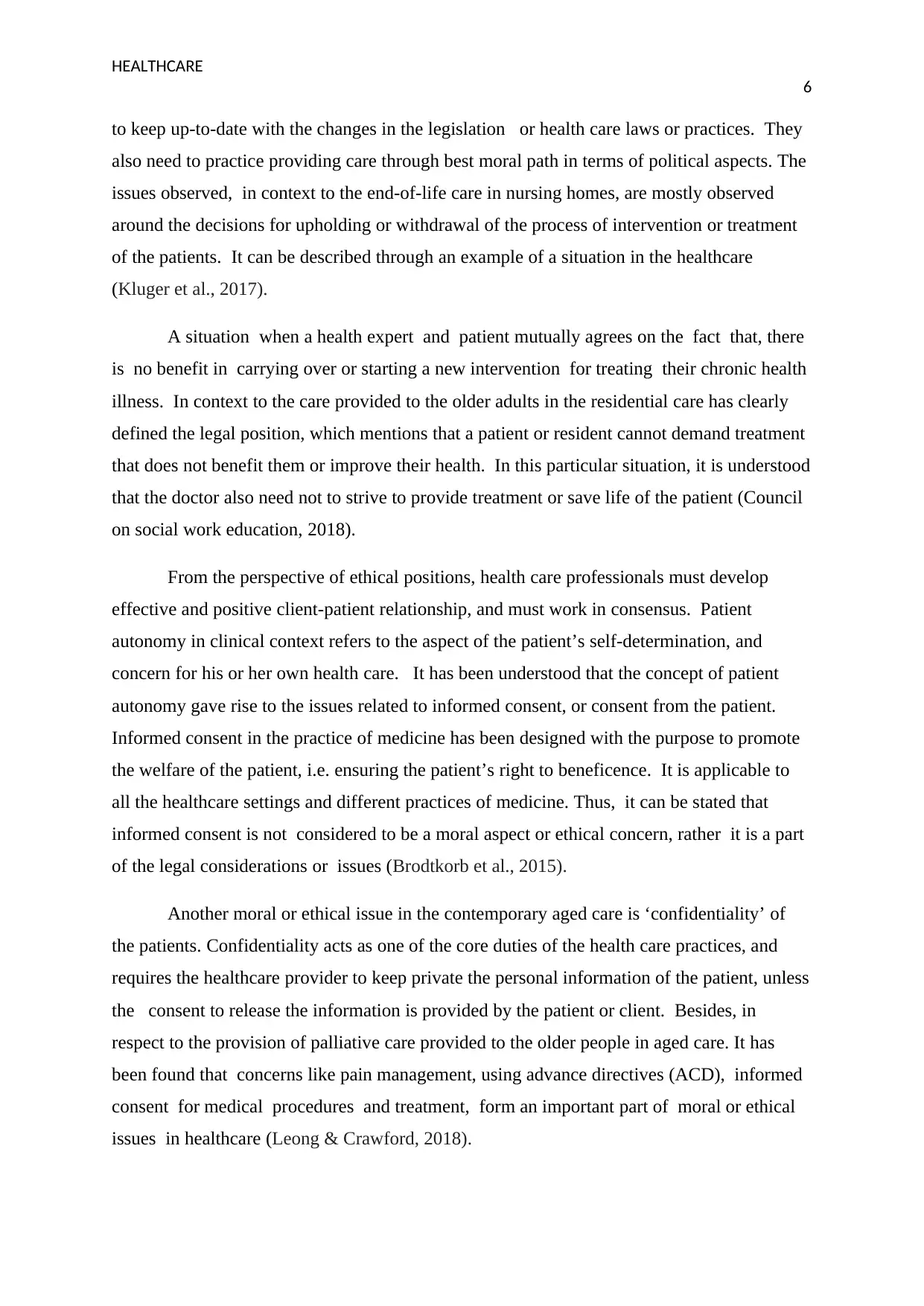
HEALTHCARE
6
to keep up-to-date with the changes in the legislation or health care laws or practices. They
also need to practice providing care through best moral path in terms of political aspects. The
issues observed, in context to the end-of-life care in nursing homes, are mostly observed
around the decisions for upholding or withdrawal of the process of intervention or treatment
of the patients. It can be described through an example of a situation in the healthcare
(Kluger et al., 2017).
A situation when a health expert and patient mutually agrees on the fact that, there
is no benefit in carrying over or starting a new intervention for treating their chronic health
illness. In context to the care provided to the older adults in the residential care has clearly
defined the legal position, which mentions that a patient or resident cannot demand treatment
that does not benefit them or improve their health. In this particular situation, it is understood
that the doctor also need not to strive to provide treatment or save life of the patient (Council
on social work education, 2018).
From the perspective of ethical positions, health care professionals must develop
effective and positive client-patient relationship, and must work in consensus. Patient
autonomy in clinical context refers to the aspect of the patient’s self-determination, and
concern for his or her own health care. It has been understood that the concept of patient
autonomy gave rise to the issues related to informed consent, or consent from the patient.
Informed consent in the practice of medicine has been designed with the purpose to promote
the welfare of the patient, i.e. ensuring the patient’s right to beneficence. It is applicable to
all the healthcare settings and different practices of medicine. Thus, it can be stated that
informed consent is not considered to be a moral aspect or ethical concern, rather it is a part
of the legal considerations or issues (Brodtkorb et al., 2015).
Another moral or ethical issue in the contemporary aged care is ‘confidentiality’ of
the patients. Confidentiality acts as one of the core duties of the health care practices, and
requires the healthcare provider to keep private the personal information of the patient, unless
the consent to release the information is provided by the patient or client. Besides, in
respect to the provision of palliative care provided to the older people in aged care. It has
been found that concerns like pain management, using advance directives (ACD), informed
consent for medical procedures and treatment, form an important part of moral or ethical
issues in healthcare (Leong & Crawford, 2018).
6
to keep up-to-date with the changes in the legislation or health care laws or practices. They
also need to practice providing care through best moral path in terms of political aspects. The
issues observed, in context to the end-of-life care in nursing homes, are mostly observed
around the decisions for upholding or withdrawal of the process of intervention or treatment
of the patients. It can be described through an example of a situation in the healthcare
(Kluger et al., 2017).
A situation when a health expert and patient mutually agrees on the fact that, there
is no benefit in carrying over or starting a new intervention for treating their chronic health
illness. In context to the care provided to the older adults in the residential care has clearly
defined the legal position, which mentions that a patient or resident cannot demand treatment
that does not benefit them or improve their health. In this particular situation, it is understood
that the doctor also need not to strive to provide treatment or save life of the patient (Council
on social work education, 2018).
From the perspective of ethical positions, health care professionals must develop
effective and positive client-patient relationship, and must work in consensus. Patient
autonomy in clinical context refers to the aspect of the patient’s self-determination, and
concern for his or her own health care. It has been understood that the concept of patient
autonomy gave rise to the issues related to informed consent, or consent from the patient.
Informed consent in the practice of medicine has been designed with the purpose to promote
the welfare of the patient, i.e. ensuring the patient’s right to beneficence. It is applicable to
all the healthcare settings and different practices of medicine. Thus, it can be stated that
informed consent is not considered to be a moral aspect or ethical concern, rather it is a part
of the legal considerations or issues (Brodtkorb et al., 2015).
Another moral or ethical issue in the contemporary aged care is ‘confidentiality’ of
the patients. Confidentiality acts as one of the core duties of the health care practices, and
requires the healthcare provider to keep private the personal information of the patient, unless
the consent to release the information is provided by the patient or client. Besides, in
respect to the provision of palliative care provided to the older people in aged care. It has
been found that concerns like pain management, using advance directives (ACD), informed
consent for medical procedures and treatment, form an important part of moral or ethical
issues in healthcare (Leong & Crawford, 2018).
Paraphrase This Document
Need a fresh take? Get an instant paraphrase of this document with our AI Paraphraser
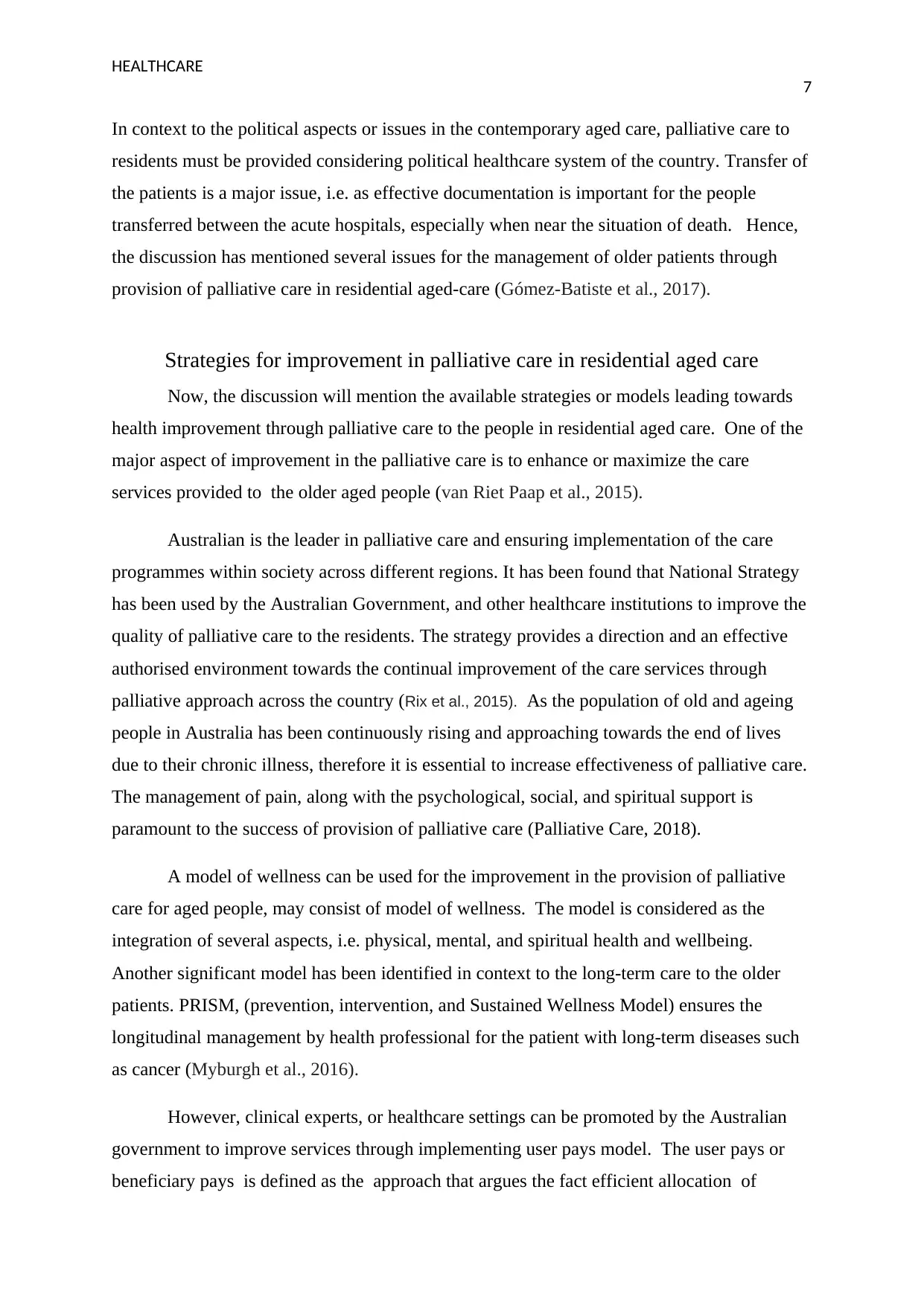
HEALTHCARE
7
In context to the political aspects or issues in the contemporary aged care, palliative care to
residents must be provided considering political healthcare system of the country. Transfer of
the patients is a major issue, i.e. as effective documentation is important for the people
transferred between the acute hospitals, especially when near the situation of death. Hence,
the discussion has mentioned several issues for the management of older patients through
provision of palliative care in residential aged-care (Gómez-Batiste et al., 2017).
Strategies for improvement in palliative care in residential aged care
Now, the discussion will mention the available strategies or models leading towards
health improvement through palliative care to the people in residential aged care. One of the
major aspect of improvement in the palliative care is to enhance or maximize the care
services provided to the older aged people (van Riet Paap et al., 2015).
Australian is the leader in palliative care and ensuring implementation of the care
programmes within society across different regions. It has been found that National Strategy
has been used by the Australian Government, and other healthcare institutions to improve the
quality of palliative care to the residents. The strategy provides a direction and an effective
authorised environment towards the continual improvement of the care services through
palliative approach across the country (Rix et al., 2015). As the population of old and ageing
people in Australia has been continuously rising and approaching towards the end of lives
due to their chronic illness, therefore it is essential to increase effectiveness of palliative care.
The management of pain, along with the psychological, social, and spiritual support is
paramount to the success of provision of palliative care (Palliative Care, 2018).
A model of wellness can be used for the improvement in the provision of palliative
care for aged people, may consist of model of wellness. The model is considered as the
integration of several aspects, i.e. physical, mental, and spiritual health and wellbeing.
Another significant model has been identified in context to the long-term care to the older
patients. PRISM, (prevention, intervention, and Sustained Wellness Model) ensures the
longitudinal management by health professional for the patient with long-term diseases such
as cancer (Myburgh et al., 2016).
However, clinical experts, or healthcare settings can be promoted by the Australian
government to improve services through implementing user pays model. The user pays or
beneficiary pays is defined as the approach that argues the fact efficient allocation of
7
In context to the political aspects or issues in the contemporary aged care, palliative care to
residents must be provided considering political healthcare system of the country. Transfer of
the patients is a major issue, i.e. as effective documentation is important for the people
transferred between the acute hospitals, especially when near the situation of death. Hence,
the discussion has mentioned several issues for the management of older patients through
provision of palliative care in residential aged-care (Gómez-Batiste et al., 2017).
Strategies for improvement in palliative care in residential aged care
Now, the discussion will mention the available strategies or models leading towards
health improvement through palliative care to the people in residential aged care. One of the
major aspect of improvement in the palliative care is to enhance or maximize the care
services provided to the older aged people (van Riet Paap et al., 2015).
Australian is the leader in palliative care and ensuring implementation of the care
programmes within society across different regions. It has been found that National Strategy
has been used by the Australian Government, and other healthcare institutions to improve the
quality of palliative care to the residents. The strategy provides a direction and an effective
authorised environment towards the continual improvement of the care services through
palliative approach across the country (Rix et al., 2015). As the population of old and ageing
people in Australia has been continuously rising and approaching towards the end of lives
due to their chronic illness, therefore it is essential to increase effectiveness of palliative care.
The management of pain, along with the psychological, social, and spiritual support is
paramount to the success of provision of palliative care (Palliative Care, 2018).
A model of wellness can be used for the improvement in the provision of palliative
care for aged people, may consist of model of wellness. The model is considered as the
integration of several aspects, i.e. physical, mental, and spiritual health and wellbeing.
Another significant model has been identified in context to the long-term care to the older
patients. PRISM, (prevention, intervention, and Sustained Wellness Model) ensures the
longitudinal management by health professional for the patient with long-term diseases such
as cancer (Myburgh et al., 2016).
However, clinical experts, or healthcare settings can be promoted by the Australian
government to improve services through implementing user pays model. The user pays or
beneficiary pays is defined as the approach that argues the fact efficient allocation of
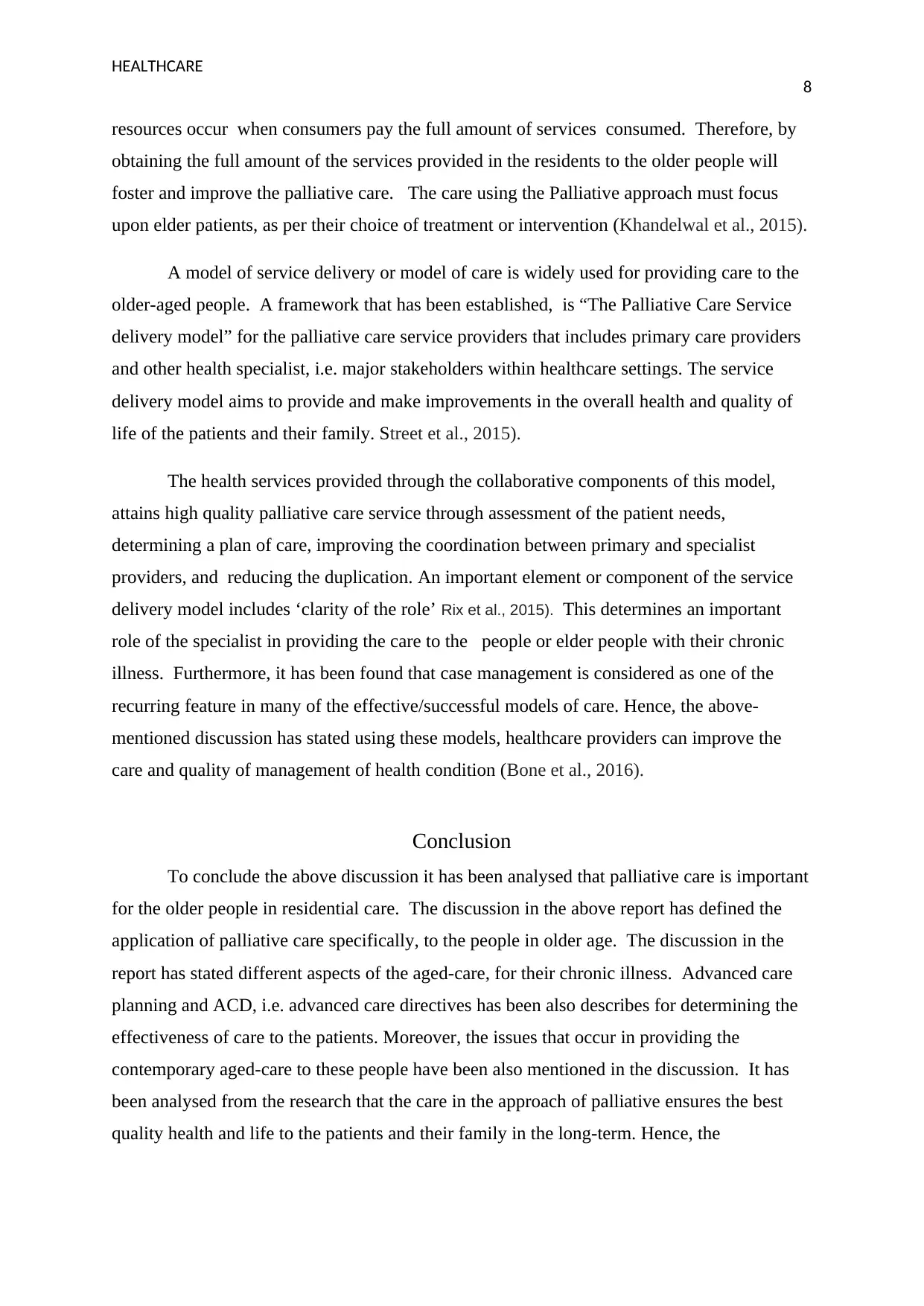
HEALTHCARE
8
resources occur when consumers pay the full amount of services consumed. Therefore, by
obtaining the full amount of the services provided in the residents to the older people will
foster and improve the palliative care. The care using the Palliative approach must focus
upon elder patients, as per their choice of treatment or intervention (Khandelwal et al., 2015).
A model of service delivery or model of care is widely used for providing care to the
older-aged people. A framework that has been established, is “The Palliative Care Service
delivery model” for the palliative care service providers that includes primary care providers
and other health specialist, i.e. major stakeholders within healthcare settings. The service
delivery model aims to provide and make improvements in the overall health and quality of
life of the patients and their family. Street et al., 2015).
The health services provided through the collaborative components of this model,
attains high quality palliative care service through assessment of the patient needs,
determining a plan of care, improving the coordination between primary and specialist
providers, and reducing the duplication. An important element or component of the service
delivery model includes ‘clarity of the role’ Rix et al., 2015). This determines an important
role of the specialist in providing the care to the people or elder people with their chronic
illness. Furthermore, it has been found that case management is considered as one of the
recurring feature in many of the effective/successful models of care. Hence, the above-
mentioned discussion has stated using these models, healthcare providers can improve the
care and quality of management of health condition (Bone et al., 2016).
Conclusion
To conclude the above discussion it has been analysed that palliative care is important
for the older people in residential care. The discussion in the above report has defined the
application of palliative care specifically, to the people in older age. The discussion in the
report has stated different aspects of the aged-care, for their chronic illness. Advanced care
planning and ACD, i.e. advanced care directives has been also describes for determining the
effectiveness of care to the patients. Moreover, the issues that occur in providing the
contemporary aged-care to these people have been also mentioned in the discussion. It has
been analysed from the research that the care in the approach of palliative ensures the best
quality health and life to the patients and their family in the long-term. Hence, the
8
resources occur when consumers pay the full amount of services consumed. Therefore, by
obtaining the full amount of the services provided in the residents to the older people will
foster and improve the palliative care. The care using the Palliative approach must focus
upon elder patients, as per their choice of treatment or intervention (Khandelwal et al., 2015).
A model of service delivery or model of care is widely used for providing care to the
older-aged people. A framework that has been established, is “The Palliative Care Service
delivery model” for the palliative care service providers that includes primary care providers
and other health specialist, i.e. major stakeholders within healthcare settings. The service
delivery model aims to provide and make improvements in the overall health and quality of
life of the patients and their family. Street et al., 2015).
The health services provided through the collaborative components of this model,
attains high quality palliative care service through assessment of the patient needs,
determining a plan of care, improving the coordination between primary and specialist
providers, and reducing the duplication. An important element or component of the service
delivery model includes ‘clarity of the role’ Rix et al., 2015). This determines an important
role of the specialist in providing the care to the people or elder people with their chronic
illness. Furthermore, it has been found that case management is considered as one of the
recurring feature in many of the effective/successful models of care. Hence, the above-
mentioned discussion has stated using these models, healthcare providers can improve the
care and quality of management of health condition (Bone et al., 2016).
Conclusion
To conclude the above discussion it has been analysed that palliative care is important
for the older people in residential care. The discussion in the above report has defined the
application of palliative care specifically, to the people in older age. The discussion in the
report has stated different aspects of the aged-care, for their chronic illness. Advanced care
planning and ACD, i.e. advanced care directives has been also describes for determining the
effectiveness of care to the patients. Moreover, the issues that occur in providing the
contemporary aged-care to these people have been also mentioned in the discussion. It has
been analysed from the research that the care in the approach of palliative ensures the best
quality health and life to the patients and their family in the long-term. Hence, the
⊘ This is a preview!⊘
Do you want full access?
Subscribe today to unlock all pages.

Trusted by 1+ million students worldwide
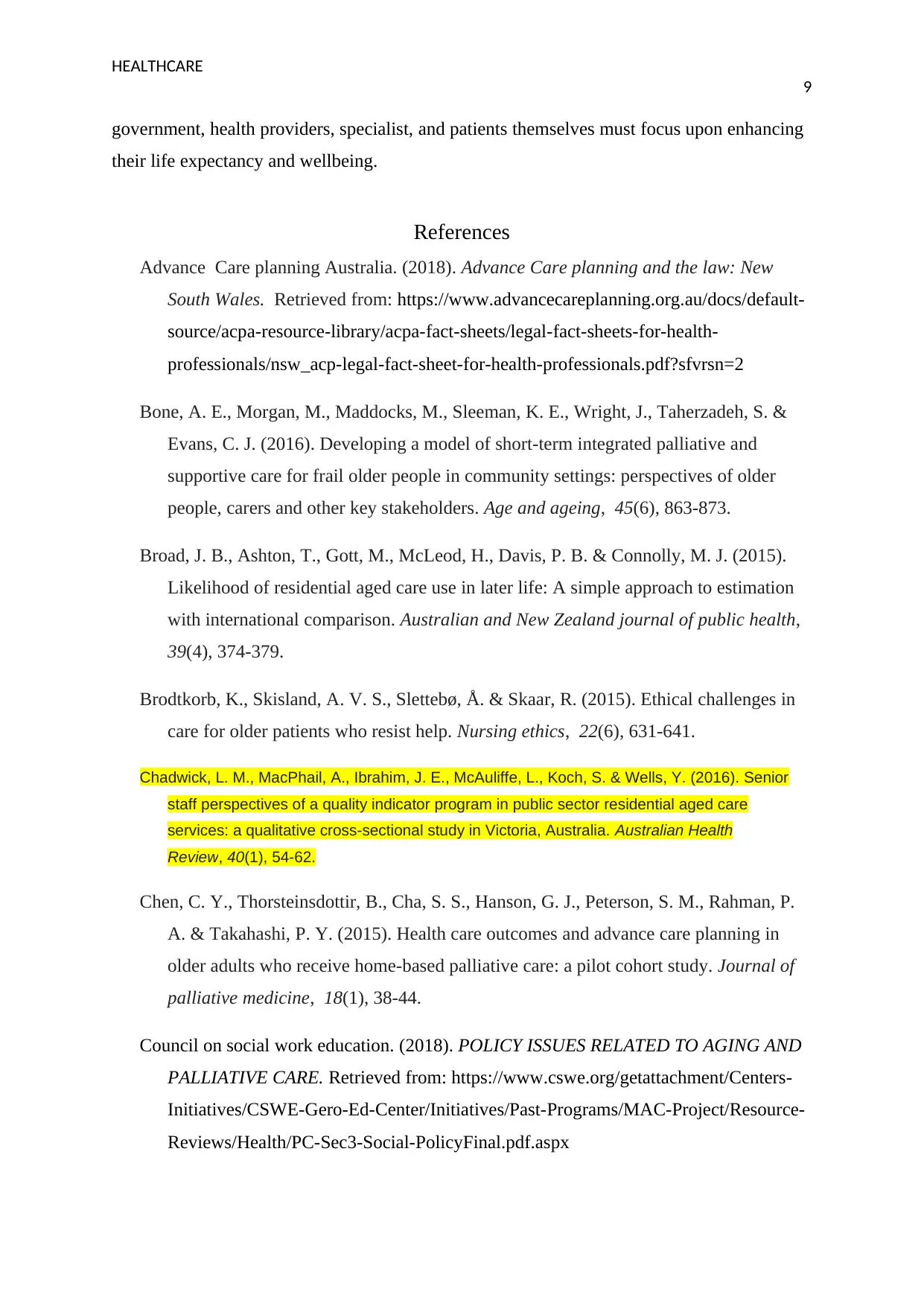
HEALTHCARE
9
government, health providers, specialist, and patients themselves must focus upon enhancing
their life expectancy and wellbeing.
References
Advance Care planning Australia. (2018). Advance Care planning and the law: New
South Wales. Retrieved from: https://www.advancecareplanning.org.au/docs/default-
source/acpa-resource-library/acpa-fact-sheets/legal-fact-sheets-for-health-
professionals/nsw_acp-legal-fact-sheet-for-health-professionals.pdf?sfvrsn=2
Bone, A. E., Morgan, M., Maddocks, M., Sleeman, K. E., Wright, J., Taherzadeh, S. &
Evans, C. J. (2016). Developing a model of short-term integrated palliative and
supportive care for frail older people in community settings: perspectives of older
people, carers and other key stakeholders. Age and ageing, 45(6), 863-873.
Broad, J. B., Ashton, T., Gott, M., McLeod, H., Davis, P. B. & Connolly, M. J. (2015).
Likelihood of residential aged care use in later life: A simple approach to estimation
with international comparison. Australian and New Zealand journal of public health,
39(4), 374-379.
Brodtkorb, K., Skisland, A. V. S., Slettebø, Å. & Skaar, R. (2015). Ethical challenges in
care for older patients who resist help. Nursing ethics, 22(6), 631-641.
Chadwick, L. M., MacPhail, A., Ibrahim, J. E., McAuliffe, L., Koch, S. & Wells, Y. (2016). Senior
staff perspectives of a quality indicator program in public sector residential aged care
services: a qualitative cross-sectional study in Victoria, Australia. Australian Health
Review, 40(1), 54-62.
Chen, C. Y., Thorsteinsdottir, B., Cha, S. S., Hanson, G. J., Peterson, S. M., Rahman, P.
A. & Takahashi, P. Y. (2015). Health care outcomes and advance care planning in
older adults who receive home-based palliative care: a pilot cohort study. Journal of
palliative medicine, 18(1), 38-44.
Council on social work education. (2018). POLICY ISSUES RELATED TO AGING AND
PALLIATIVE CARE. Retrieved from: https://www.cswe.org/getattachment/Centers-
Initiatives/CSWE-Gero-Ed-Center/Initiatives/Past-Programs/MAC-Project/Resource-
Reviews/Health/PC-Sec3-Social-PolicyFinal.pdf.aspx
9
government, health providers, specialist, and patients themselves must focus upon enhancing
their life expectancy and wellbeing.
References
Advance Care planning Australia. (2018). Advance Care planning and the law: New
South Wales. Retrieved from: https://www.advancecareplanning.org.au/docs/default-
source/acpa-resource-library/acpa-fact-sheets/legal-fact-sheets-for-health-
professionals/nsw_acp-legal-fact-sheet-for-health-professionals.pdf?sfvrsn=2
Bone, A. E., Morgan, M., Maddocks, M., Sleeman, K. E., Wright, J., Taherzadeh, S. &
Evans, C. J. (2016). Developing a model of short-term integrated palliative and
supportive care for frail older people in community settings: perspectives of older
people, carers and other key stakeholders. Age and ageing, 45(6), 863-873.
Broad, J. B., Ashton, T., Gott, M., McLeod, H., Davis, P. B. & Connolly, M. J. (2015).
Likelihood of residential aged care use in later life: A simple approach to estimation
with international comparison. Australian and New Zealand journal of public health,
39(4), 374-379.
Brodtkorb, K., Skisland, A. V. S., Slettebø, Å. & Skaar, R. (2015). Ethical challenges in
care for older patients who resist help. Nursing ethics, 22(6), 631-641.
Chadwick, L. M., MacPhail, A., Ibrahim, J. E., McAuliffe, L., Koch, S. & Wells, Y. (2016). Senior
staff perspectives of a quality indicator program in public sector residential aged care
services: a qualitative cross-sectional study in Victoria, Australia. Australian Health
Review, 40(1), 54-62.
Chen, C. Y., Thorsteinsdottir, B., Cha, S. S., Hanson, G. J., Peterson, S. M., Rahman, P.
A. & Takahashi, P. Y. (2015). Health care outcomes and advance care planning in
older adults who receive home-based palliative care: a pilot cohort study. Journal of
palliative medicine, 18(1), 38-44.
Council on social work education. (2018). POLICY ISSUES RELATED TO AGING AND
PALLIATIVE CARE. Retrieved from: https://www.cswe.org/getattachment/Centers-
Initiatives/CSWE-Gero-Ed-Center/Initiatives/Past-Programs/MAC-Project/Resource-
Reviews/Health/PC-Sec3-Social-PolicyFinal.pdf.aspx
Paraphrase This Document
Need a fresh take? Get an instant paraphrase of this document with our AI Paraphraser
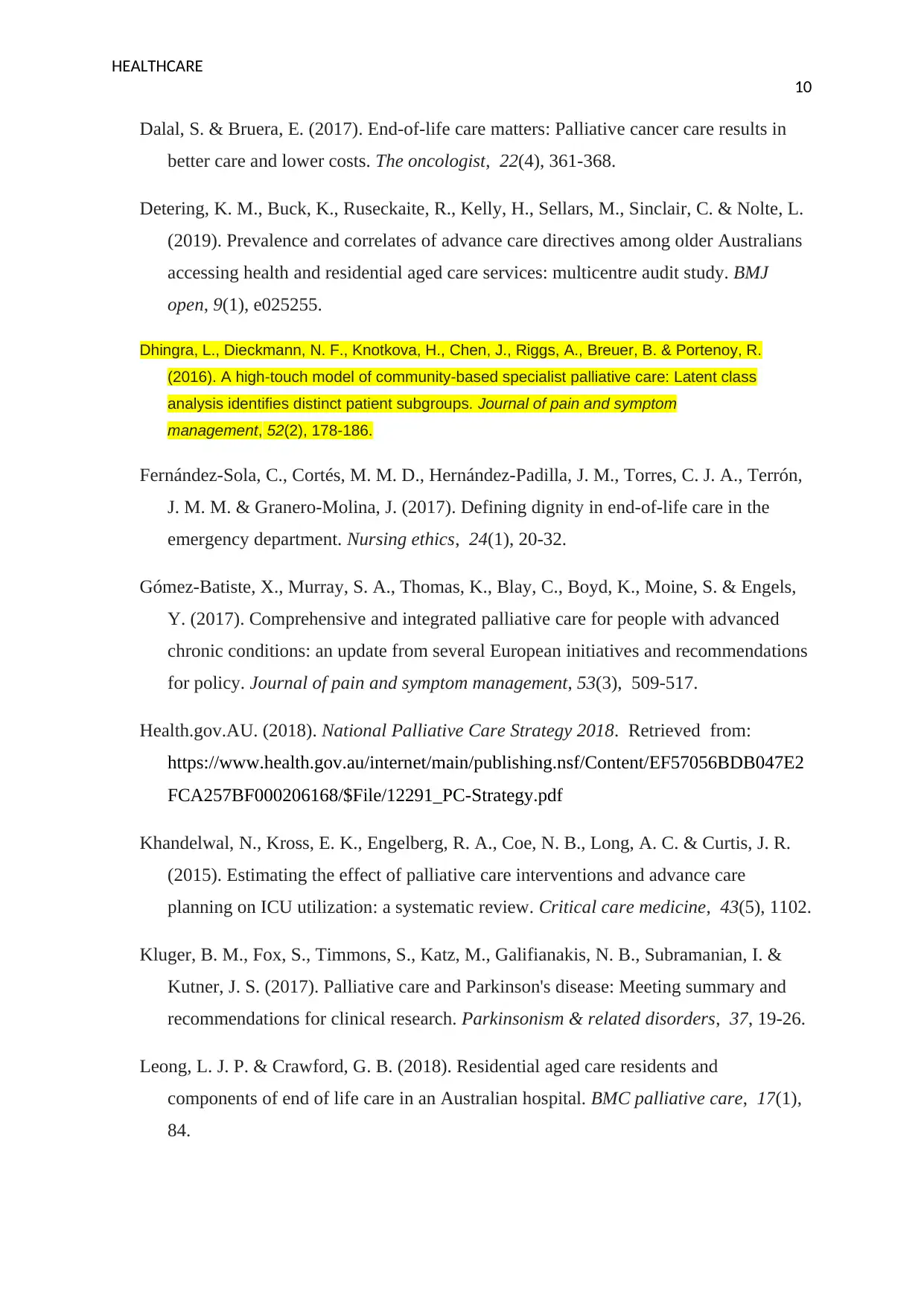
HEALTHCARE
10
Dalal, S. & Bruera, E. (2017). End‐of‐life care matters: Palliative cancer care results in
better care and lower costs. The oncologist, 22(4), 361-368.
Detering, K. M., Buck, K., Ruseckaite, R., Kelly, H., Sellars, M., Sinclair, C. & Nolte, L.
(2019). Prevalence and correlates of advance care directives among older Australians
accessing health and residential aged care services: multicentre audit study. BMJ
open, 9(1), e025255.
Dhingra, L., Dieckmann, N. F., Knotkova, H., Chen, J., Riggs, A., Breuer, B. & Portenoy, R.
(2016). A high-touch model of community-based specialist palliative care: Latent class
analysis identifies distinct patient subgroups. Journal of pain and symptom
management, 52(2), 178-186.
Fernández-Sola, C., Cortés, M. M. D., Hernández-Padilla, J. M., Torres, C. J. A., Terrón,
J. M. M. & Granero-Molina, J. (2017). Defining dignity in end-of-life care in the
emergency department. Nursing ethics, 24(1), 20-32.
Gómez-Batiste, X., Murray, S. A., Thomas, K., Blay, C., Boyd, K., Moine, S. & Engels,
Y. (2017). Comprehensive and integrated palliative care for people with advanced
chronic conditions: an update from several European initiatives and recommendations
for policy. Journal of pain and symptom management, 53(3), 509-517.
Health.gov.AU. (2018). National Palliative Care Strategy 2018. Retrieved from:
https://www.health.gov.au/internet/main/publishing.nsf/Content/EF57056BDB047E2
FCA257BF000206168/$File/12291_PC-Strategy.pdf
Khandelwal, N., Kross, E. K., Engelberg, R. A., Coe, N. B., Long, A. C. & Curtis, J. R.
(2015). Estimating the effect of palliative care interventions and advance care
planning on ICU utilization: a systematic review. Critical care medicine, 43(5), 1102.
Kluger, B. M., Fox, S., Timmons, S., Katz, M., Galifianakis, N. B., Subramanian, I. &
Kutner, J. S. (2017). Palliative care and Parkinson's disease: Meeting summary and
recommendations for clinical research. Parkinsonism & related disorders, 37, 19-26.
Leong, L. J. P. & Crawford, G. B. (2018). Residential aged care residents and
components of end of life care in an Australian hospital. BMC palliative care, 17(1),
84.
10
Dalal, S. & Bruera, E. (2017). End‐of‐life care matters: Palliative cancer care results in
better care and lower costs. The oncologist, 22(4), 361-368.
Detering, K. M., Buck, K., Ruseckaite, R., Kelly, H., Sellars, M., Sinclair, C. & Nolte, L.
(2019). Prevalence and correlates of advance care directives among older Australians
accessing health and residential aged care services: multicentre audit study. BMJ
open, 9(1), e025255.
Dhingra, L., Dieckmann, N. F., Knotkova, H., Chen, J., Riggs, A., Breuer, B. & Portenoy, R.
(2016). A high-touch model of community-based specialist palliative care: Latent class
analysis identifies distinct patient subgroups. Journal of pain and symptom
management, 52(2), 178-186.
Fernández-Sola, C., Cortés, M. M. D., Hernández-Padilla, J. M., Torres, C. J. A., Terrón,
J. M. M. & Granero-Molina, J. (2017). Defining dignity in end-of-life care in the
emergency department. Nursing ethics, 24(1), 20-32.
Gómez-Batiste, X., Murray, S. A., Thomas, K., Blay, C., Boyd, K., Moine, S. & Engels,
Y. (2017). Comprehensive and integrated palliative care for people with advanced
chronic conditions: an update from several European initiatives and recommendations
for policy. Journal of pain and symptom management, 53(3), 509-517.
Health.gov.AU. (2018). National Palliative Care Strategy 2018. Retrieved from:
https://www.health.gov.au/internet/main/publishing.nsf/Content/EF57056BDB047E2
FCA257BF000206168/$File/12291_PC-Strategy.pdf
Khandelwal, N., Kross, E. K., Engelberg, R. A., Coe, N. B., Long, A. C. & Curtis, J. R.
(2015). Estimating the effect of palliative care interventions and advance care
planning on ICU utilization: a systematic review. Critical care medicine, 43(5), 1102.
Kluger, B. M., Fox, S., Timmons, S., Katz, M., Galifianakis, N. B., Subramanian, I. &
Kutner, J. S. (2017). Palliative care and Parkinson's disease: Meeting summary and
recommendations for clinical research. Parkinsonism & related disorders, 37, 19-26.
Leong, L. J. P. & Crawford, G. B. (2018). Residential aged care residents and
components of end of life care in an Australian hospital. BMC palliative care, 17(1),
84.
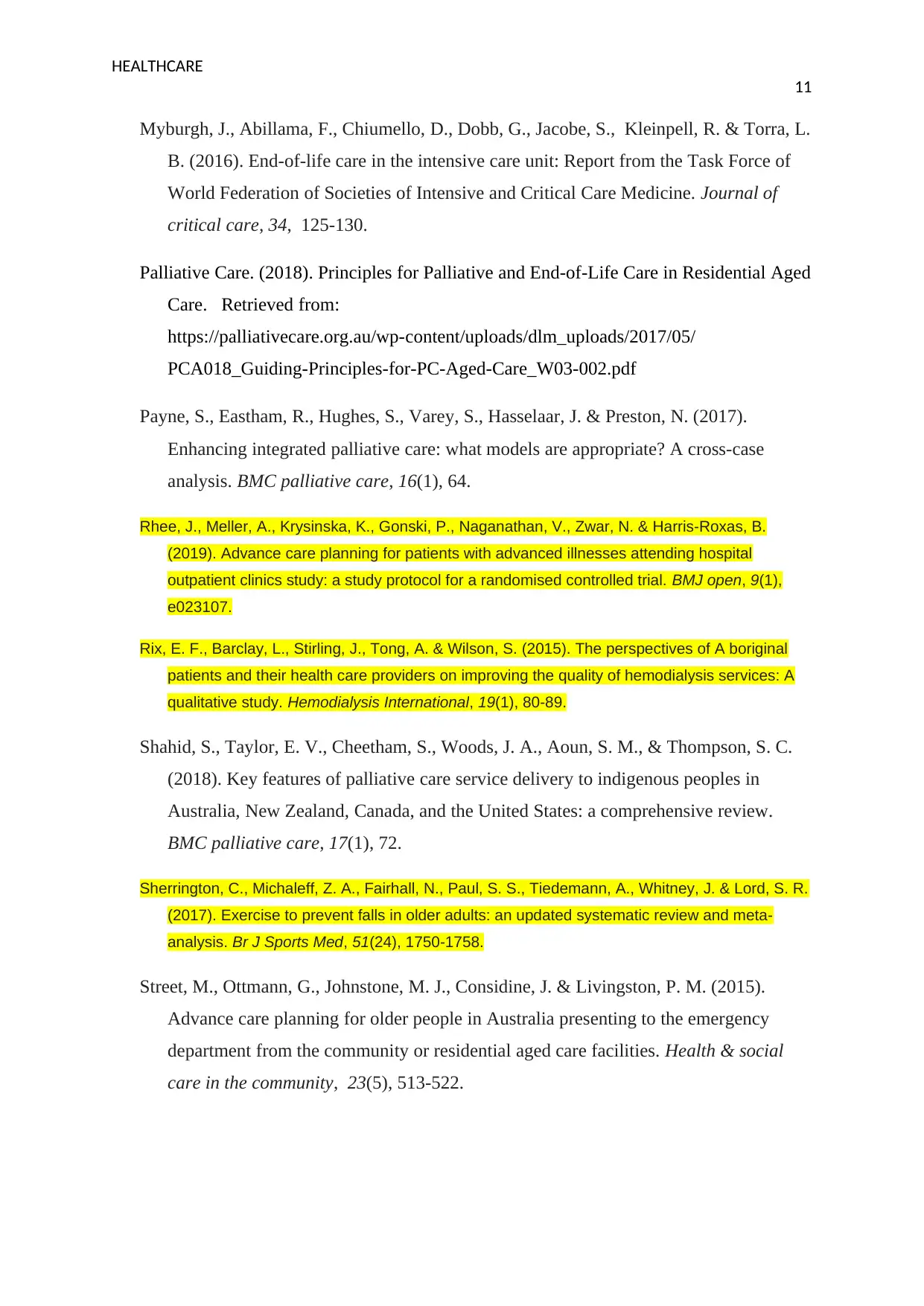
HEALTHCARE
11
Myburgh, J., Abillama, F., Chiumello, D., Dobb, G., Jacobe, S., Kleinpell, R. & Torra, L.
B. (2016). End-of-life care in the intensive care unit: Report from the Task Force of
World Federation of Societies of Intensive and Critical Care Medicine. Journal of
critical care, 34, 125-130.
Palliative Care. (2018). Principles for Palliative and End-of-Life Care in Residential Aged
Care. Retrieved from:
https://palliativecare.org.au/wp-content/uploads/dlm_uploads/2017/05/
PCA018_Guiding-Principles-for-PC-Aged-Care_W03-002.pdf
Payne, S., Eastham, R., Hughes, S., Varey, S., Hasselaar, J. & Preston, N. (2017).
Enhancing integrated palliative care: what models are appropriate? A cross-case
analysis. BMC palliative care, 16(1), 64.
Rhee, J., Meller, A., Krysinska, K., Gonski, P., Naganathan, V., Zwar, N. & Harris-Roxas, B.
(2019). Advance care planning for patients with advanced illnesses attending hospital
outpatient clinics study: a study protocol for a randomised controlled trial. BMJ open, 9(1),
e023107.
Rix, E. F., Barclay, L., Stirling, J., Tong, A. & Wilson, S. (2015). The perspectives of A boriginal
patients and their health care providers on improving the quality of hemodialysis services: A
qualitative study. Hemodialysis International, 19(1), 80-89.
Shahid, S., Taylor, E. V., Cheetham, S., Woods, J. A., Aoun, S. M., & Thompson, S. C.
(2018). Key features of palliative care service delivery to indigenous peoples in
Australia, New Zealand, Canada, and the United States: a comprehensive review.
BMC palliative care, 17(1), 72.
Sherrington, C., Michaleff, Z. A., Fairhall, N., Paul, S. S., Tiedemann, A., Whitney, J. & Lord, S. R.
(2017). Exercise to prevent falls in older adults: an updated systematic review and meta-
analysis. Br J Sports Med, 51(24), 1750-1758.
Street, M., Ottmann, G., Johnstone, M. J., Considine, J. & Livingston, P. M. (2015).
Advance care planning for older people in Australia presenting to the emergency
department from the community or residential aged care facilities. Health & social
care in the community, 23(5), 513-522.
11
Myburgh, J., Abillama, F., Chiumello, D., Dobb, G., Jacobe, S., Kleinpell, R. & Torra, L.
B. (2016). End-of-life care in the intensive care unit: Report from the Task Force of
World Federation of Societies of Intensive and Critical Care Medicine. Journal of
critical care, 34, 125-130.
Palliative Care. (2018). Principles for Palliative and End-of-Life Care in Residential Aged
Care. Retrieved from:
https://palliativecare.org.au/wp-content/uploads/dlm_uploads/2017/05/
PCA018_Guiding-Principles-for-PC-Aged-Care_W03-002.pdf
Payne, S., Eastham, R., Hughes, S., Varey, S., Hasselaar, J. & Preston, N. (2017).
Enhancing integrated palliative care: what models are appropriate? A cross-case
analysis. BMC palliative care, 16(1), 64.
Rhee, J., Meller, A., Krysinska, K., Gonski, P., Naganathan, V., Zwar, N. & Harris-Roxas, B.
(2019). Advance care planning for patients with advanced illnesses attending hospital
outpatient clinics study: a study protocol for a randomised controlled trial. BMJ open, 9(1),
e023107.
Rix, E. F., Barclay, L., Stirling, J., Tong, A. & Wilson, S. (2015). The perspectives of A boriginal
patients and their health care providers on improving the quality of hemodialysis services: A
qualitative study. Hemodialysis International, 19(1), 80-89.
Shahid, S., Taylor, E. V., Cheetham, S., Woods, J. A., Aoun, S. M., & Thompson, S. C.
(2018). Key features of palliative care service delivery to indigenous peoples in
Australia, New Zealand, Canada, and the United States: a comprehensive review.
BMC palliative care, 17(1), 72.
Sherrington, C., Michaleff, Z. A., Fairhall, N., Paul, S. S., Tiedemann, A., Whitney, J. & Lord, S. R.
(2017). Exercise to prevent falls in older adults: an updated systematic review and meta-
analysis. Br J Sports Med, 51(24), 1750-1758.
Street, M., Ottmann, G., Johnstone, M. J., Considine, J. & Livingston, P. M. (2015).
Advance care planning for older people in Australia presenting to the emergency
department from the community or residential aged care facilities. Health & social
care in the community, 23(5), 513-522.
⊘ This is a preview!⊘
Do you want full access?
Subscribe today to unlock all pages.

Trusted by 1+ million students worldwide
1 out of 13
Related Documents
Your All-in-One AI-Powered Toolkit for Academic Success.
+13062052269
info@desklib.com
Available 24*7 on WhatsApp / Email
![[object Object]](/_next/static/media/star-bottom.7253800d.svg)
Unlock your academic potential
Copyright © 2020–2026 A2Z Services. All Rights Reserved. Developed and managed by ZUCOL.





